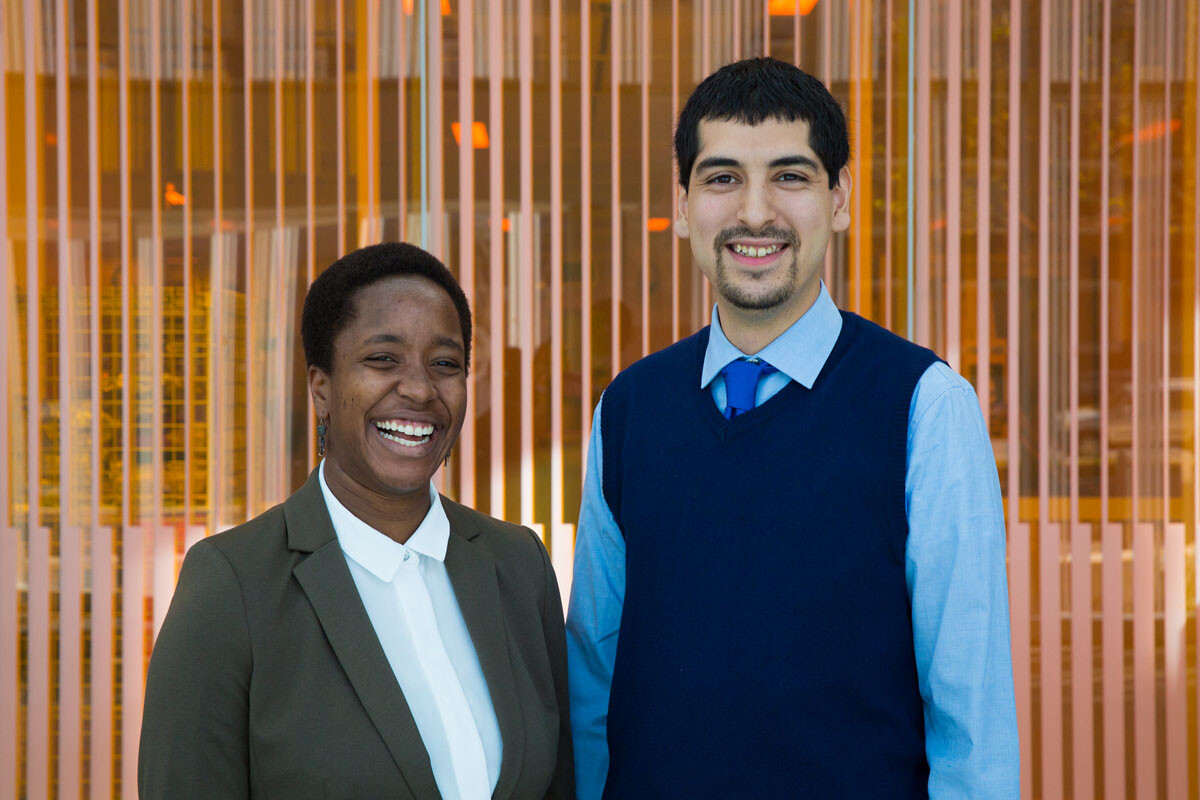
At a Glance
Recipients
Sade Oba (EAS'16)
Alfredo Muniz (EAS'16)
Project Mentor
Jonathan Smith, Olga and Alberico Pompa Professor of Engineering and Applied Science
Connect
http://www.xeedlimits.com/
It takes most of us just a few minutes to get dressed in the morning. But for the 1.5 million Americans suffering from Parkinson’s disease, simple, routine actions like this are often daunting obstacles that become the worst part of the day.
With the support of the President’s Innovation Prize, 2016 Engineering graduates Sade Oba and Alfredo Muniz are hoping to make a difference in the lives of Parkinson’s patients across the country.
Oba and Muniz are the co-founders of XEED, a network of wearable sensors that tracks the movement of patients’ limbs and records detailed data.
A rough estimate of the number of steps taken in a day might be enough for the average fitness tracker or smart watch user, but for people with movement disorders like Parkinson’s, more fine-grained data could be life changing.
Detailed information on body movements, says Oba, can help educate patients on how to adjust their daily activities in order to improve their lives. “What we want,” says Oba, “is for our patients to feel that they can exceed the limitations that Parkinson’s imposes on them every single day.”
XEED’s bands are worn on the wrists and ankles, which allows them to record precise measurements of elbow, shoulder, knee, and hip movements. In addition to simply recording up-and-down motions, the bands employ algorithms to measure angles, which opens the door to a vast array of potential insights for patients and physical therapists. The algorithms are drawn directly from those that help medical robotic arms perform precise surgeries.
Both from Houston, Oba and Muniz first met at a summer program for students interested in Science, Technology, Engineering and Math. They later attended high school together. Jonathan Smith, their faculty mentor and Penn’s Olga and Alberico Pompa Professor of Computer and Information Science, says that Oba and Muniz are destined for success.
“I have had very few students in my 27 years at Penn as inventive as Sade and Alfredo,” Smith says. “They are just tremendous.”
Oba and Muniz do not want to stop with Parkinson’s disease. If XEED is successful, they say, it will make an impact across every neurological movement disorder.
“We can see that this is just a seed that’s being planted,” Oba says. “This is going to grow tremendously from here.”
For now, Oba and Muniz plan to use the President’s Innovation Prize to conduct additional research and build hundreds of devices. They also hope to work with major Parkinson’s disease organizations and advocacy groups, such as the Michael J. Fox Foundation, to identify more patients in need and refine their product.
The pair says that the process of taking XEED from an idea to a physical object to a fledgling business would not have been possible without the support they received at Penn along the way.
“At Penn,” Muniz says, “it doesn’t matter where you came from, what your socioeconomic status or your race is. At Penn, we’re all equal. So it’s really up to you to see what you want to do, because the resources are here. If you want to build a company like us, you’ll be able to.”

Recipients
Sade Oba (EAS'16)
Alfredo Muniz (EAS'16)
Project Mentor
Jonathan Smith, Olga and Alberico Pompa Professor of Engineering and Applied Science
Connect
http://www.xeedlimits.com/